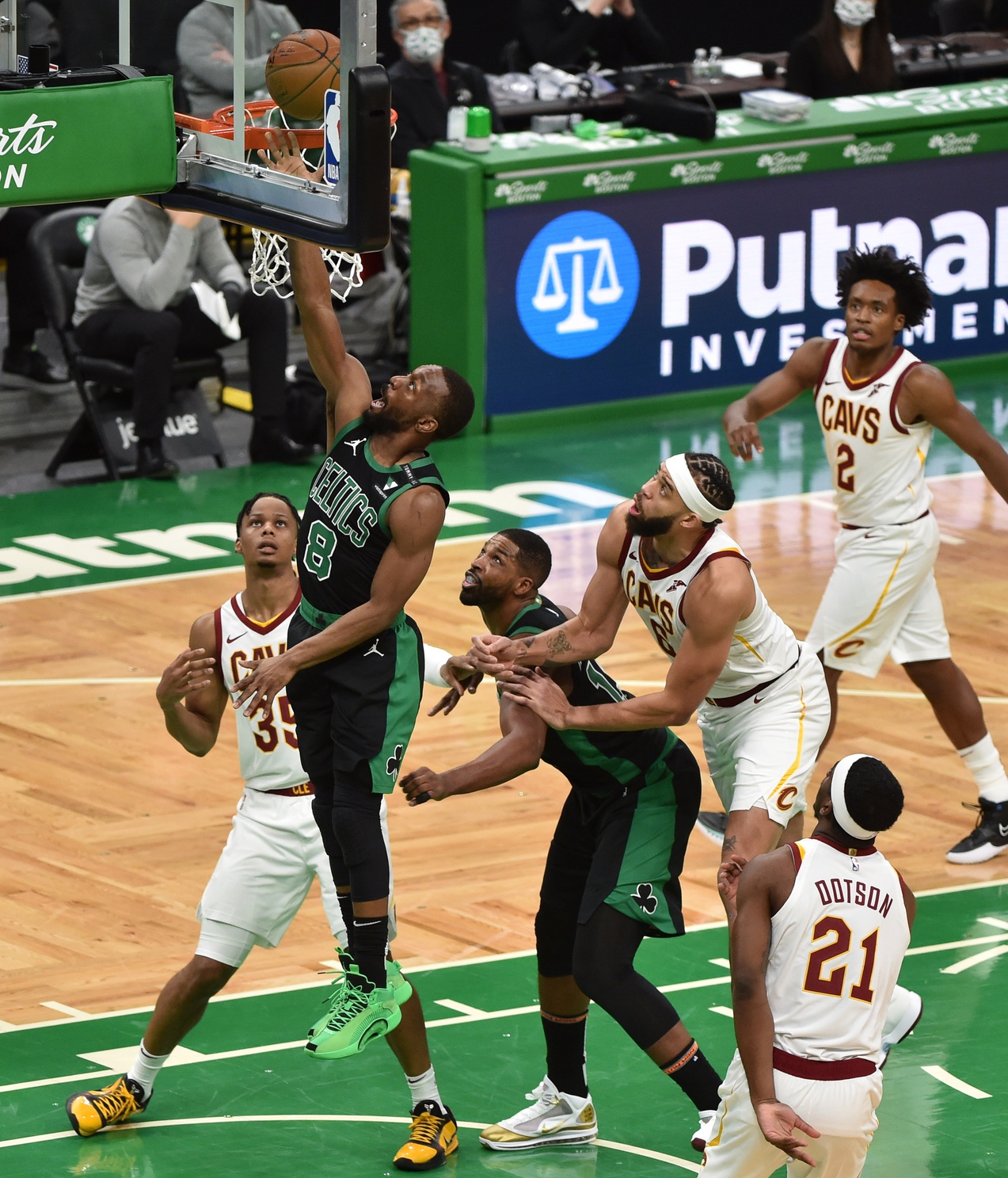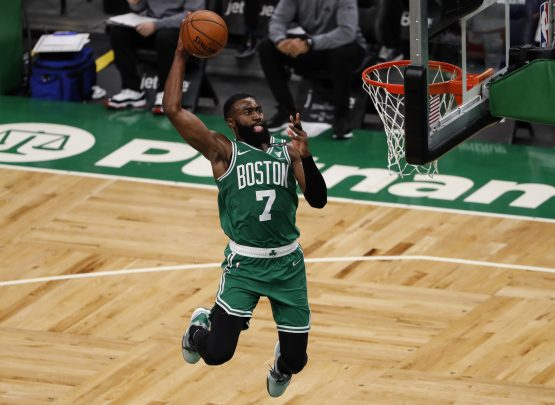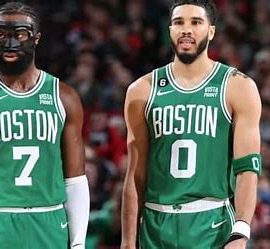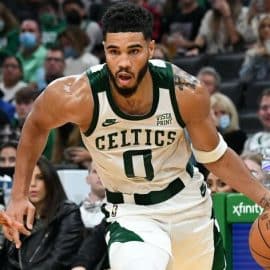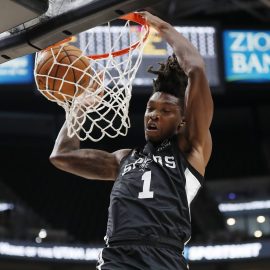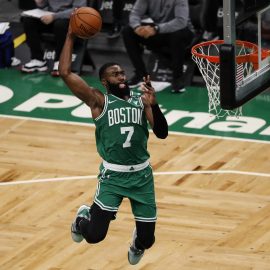Few things are more uplifting in a Celtics fan’s life than a wall-to-wall blowout after a streak of losses (and, before that, a bunch of COVID-necessitated postponements). Let’s go through key points:
1. This was a legit win, not Goliath trampling David.
The Cleveland Cavaliers got so bad in the two seasons following LeBron James’ (second) departure from the franchise that it’s hard to not still think of the Cavs as a definitively bad team. They are not. Even if they don’t stay as solid as they’ve been in the first quarter of the season, the leaps by Collin Sexton and Darius Garland, as well as their statistically solid defense (fourth-best in opponent points per game and points allowed per 100 possessions) aren’t just flukes. They’re a real squad on the rise.
Point being: The Celtics dropping an unmitigated, unrelenting forty-point ass-whooping on the Cavs means something. Hopefully they don’t let it slip against the Bulls, who are Bad Actually, tomorrow night.
2. Cs kept pushing all night.
Cleveland had no counter for the relentlessness of Jaylen Brown, Kemba Walker and Daniel Theis (and, later, for the bench crew). The Celtics ate hearty meals from their 55.9% shooting as jump shots, transition buckets or points in the paint (78 points total from the two latter categories).
Yet at no point—at least not until fairly late in the fourth quarter—did Boston play like a coasting team, as it could have starting anywhere in early Q3. They played strong defense the whole time, stifling not only the Sexland duo but also reliable dudes like Larry Nance Jr. and Andre Drummond (who for all his faults has walloped Boston bigs like rented mules for many years). Tristan Thompson and Daniel Theis had no problem containing their center opposition on offense or defense, the former via domination of the boards, the latter via stretchability and speed. Brown and Smart put guards and wings alike through hell. And even when Brad Stevens pulled the starters and it was up to Carsen Edwards, Aaron Nesmith and Rob Williams to exert defensive pressure, they acquitted themselves pretty well. (Especially impressed with Nesmith’s rebounding ability, which, IMO, will be as important for him in making a case for a rotation role as any threes he can make, and with Edwards’ strong all-around performance. The latter is a holy terror whenever Cleveland is his opponent.)
3. Jaylen Brown. Again.
We’ve reached a point in this young season at which Brown racking up point totals in the high 20s and low to mid-30s is just a thing that happens. (Including the games when Tatum was active.) Fifteen games in, there’s enough raw data on Jaylen Brown, not to mention undeniable evidence of his acrobatic tenacity on your screen every game night, to make a realistic (if imperfect) assessment of his season. His per-game line for 2020-2021 as of this morning is 27-6-4-2-1 (w/ decimals rounded for simplicity’s sake) at a 31.6% usage rate, taking 20 shots a game for 53% from the floor, 43% from deep and 78% from the line (the latter is no longer a significant exploitable weakness. That’ll all regress a bit when Tatum returns and Kemba Walker’s minutes tick upward…but do we really think it’ll be much of a regression? Is it really unreasonable to suggest that this slash line is basically the player Brown is? I don’t think so.
Which brings me to his feat last night. We often talk about number of field-goal attempts when analyzing offensive efficiency, but we don’t mention minutes played nearly as much:
Most points by any player in under 20 minutes in the shot clock era 👀 @TDBank_US | #HumanBehindTheNumber pic.twitter.com/3CUhvH1kOV
— Boston Celtics (@celtics) January 25, 2021
That’s unheard of efficiency-wise: 33 points, only 4 of them from the free-throw line, so that’s 29 points on 13 field-goal makes and just 20 FG attempts. In 19 minutes. Unlike Tatum, Brown hasn’t been a scoring juggernaut since his AAU days; he’s developed his offense in a slow, methodical approach and now has incredible discipline in shot selection that plenty of high-volume scorers never bother to develop.
4. SMARF reined it in, to great success.
Evidence bears out that Marcus Smart’s biggest gaffes/least effective games come when a). he lets frustration get the best of him or b). shoots too much and tried to do to much in general. Sometimes these happen simultaneously, as in the recent Philly games.
Last night, then, was the other side of the SMARF coin: where his offensive focus is less on getting shots up and more on creating better opportunities for his teammates, evidenced by the 9 assists and his efficiently scored 12 points (on 62.5% shooting). Defensively, he was also on point, earning 5 of the team’s total 14 steals and hounding everyone switched onto him.
5. The imminent death of the double-big lineup?
In his game story, MassLive beat writer Matt Vautour speculated that Tatum’s expected return to the Celtics tonight in Chicago would mean no room for the Daniel Theis/Tristan Thompson starting pair.
Ordinarily I’d say the same. Smart is objectively one of the team’s five best players this season (the others being Tatum, Brown, Walker and Theis), and I think you can choose to start Theis or Thompson based on the matchup without either man having a fit about his minutes. Then again, maybe you want Smart anchoring the bench with Pritchard out and Teague in a semi-slump? Also, you gotta start thinking about how you deploy Rob Williams—who, at this point, could probably be a starting center—alongside Theis and Thompson. Wouldn’t be surprised if somehow this quandary is only resolved with a trade in the near future.
Add The Sports Daily to your Google News Feed!
